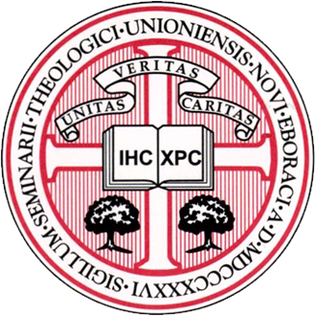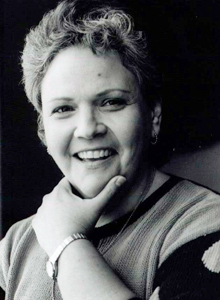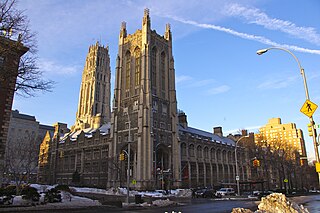Related Research Articles

Union Theological Seminary in the City of New York is a private ecumenical liberal Christian seminary in Morningside Heights, Manhattan, affiliated with Columbia University. Columbia University lists UTS among its affiliate schools, alongside Barnard College and Teachers College. Since 1928, the seminary has served as Columbia's constituent faculty of theology. In 1964, UTS also established an affiliation with the neighboring Jewish Theological Seminary of America. Despite its affiliation with Columbia University, UTS is an independent institution with its own administration and Board of Trustees. UTS confers the following degrees: Master of Divinity (MDiv), Master of Divinity & Social Work dual degree (MDSW), Master of Arts in religion (MAR), Master of Arts in Social Justice (MASJ), Master of Sacred Theology (STM), Doctor of Ministry (DMin), and Doctor of Philosophy (PhD).

Womanism is a feminist movement, primarily championed by Black feminists, originating in the work of African American author Alice Walker in her 1983 book In Search of Our Mothers' Gardens. Walker coined the term "womanist" in the short story "Coming Apart" in 1979. Her initial use of the term evolved to envelop a spectrum of issues and perspectives facing black women and others. Walker defined "womanism" as embracing the courage, audacity, and self-assured demeanor of Black women, alongside their love for other women, themselves, and all of humanity. Since its inception by Walker, womanism has expanded to encompass various domains, giving rise to concepts such as Africana womanism and womanist theology or spirituality.
Womanist theology is a methodological approach to theology which centers the experience and perspectives of Black women, particularly African-American women. The first generation of womanist theologians and ethicists began writing in the mid to late 1980s, and the field has since expanded significantly. The term has its roots in Alice Walker's writings on womanism. "Womanist theology" was first used in an article in 1987 by Delores S. Williams. Within Christian theological discourse, Womanist theology emerged as a corrective to early feminist theology written by white feminists that did not address the impact of race on women's lives, or take into account the realities faced by Black women within the United States. Similarly, womanist theologians highlighted the ways in which Black theology, written predominantly by male theologians, failed to consider the perspectives and insights of Black women. Scholars who espouse womanist theology are not monolithic nor do they adopt each aspect of Walker's definition. Rather, these scholars often find kinship in their anti-sexist, antiracist and anti-classist commitments to feminist and liberation theologies.

James Hal Cone was an American Methodist minister and theologian. He is best known for his advocacy of black theology and black liberation theology. His 1969 book Black Theology and Black Power provided a new way to comprehensively define the distinctiveness of theology in the black church. His message was that Black Power, defined as black people asserting the humanity that white supremacy denied, was the gospel in America. Jesus came to liberate the oppressed, advocating the same thing as Black Power. He argued that white American churches preached a gospel based on white supremacy, antithetical to the gospel of Jesus.

Garrett–Evangelical Theological Seminary (Garrett) is a private seminary and graduate school of theology related to the United Methodist Church and is ecumenical in spirit. It is located in Evanston, Illinois, on the campus of Northwestern University. The seminary offers master's- and doctoral-level degrees, as well as certificate, micro-credentialing, and lifelong learning programs. It has thousands of alumni serving in ministry, education, organizational leadership, and public service throughout the world.

The Vanderbilt Divinity School and Graduate Department of Religion is an interdenominational divinity school at Vanderbilt University, a major research university located in Nashville, Tennessee. It is one of only six university-based schools of religion in the United States without a denominational affiliation that service primarily mainline Protestantism.
Anthony B. Pinn is an American professor working at the intersections of African-American religion, constructive theology, and humanist thought. Pinn is the Agnes Cullen Arnold Professor of Humanities and Professor of Religious Studies at Rice University. He is founder and executive director of the Center for Engaged Research and Collaborative Learning in Houston, Texas, and Director of Research for the Institute for Humanist Studies in Washington, D.C.

Ada María Isasi-Díaz was a Cuban-American theologian who served as professor emerita of ethics and theology at Drew University in Madison, New Jersey. As a Hispanic theologian, she was an innovator of Hispanic theology in general and specifically of mujerista theology. She was founder and co-director of the Hispanic Institute of Theology at Drew University until her retirement in 2009.

Miguel A. De La Torre is a professor of Social Ethics and Latino Studies at Iliff School of Theology, author, and an ordained Southern Baptist minister.

Katie Geneva Cannon was an American Christian theologian and ethicist associated with womanist theology and black theology. In 1974 she became the first African-American woman ordained in the United Presbyterian Church (USA).

Monica A. Coleman is a contemporary theologian associated with process theology and womanist theology. She is currently Professor of Africana Studies and the John and Patricia Cochran Scholar for Inclusive Excellence at the University of Delaware, as well as the Faculty Co-Director Emerita for the Center for Process Studies. Her research interests include Whiteheadian metaphysics, constructive theology, philosophical theology, metaphorical theology, black and womanist theologies, African American religions, African traditional religions, theology and sexual and domestic violence, and mental health and theology. Coleman is an ordained elder in the African Methodist Episcopal Church.

Jacquelyn Grant is an American theologian, a Methodist minister. Alongside Katie Cannon, Delores S. Williams, and Kelly Brown Douglas, Grant is considered one of the four founders of womanist theology. Womanist theology addresses theology from the viewpoint of Black women, reflecting on both their perspectives and experience in regards to faith and moral standards. Grant is currently the Callaway Professor of Systematic Theology at the Interdenominational Theological Center in Atlanta.
Marcia Y. Riggs is an American author, the J. Erskine Love Professor of Christian Ethics, and the Director of ThM Program at Columbia Theological Seminary, a womanist theologian, and a recognized authority on the black woman's club movement of the nineteenth century. She was one of six Luce Scholars named by the Association of Theological Schools in the United States and Canada (ATS) and The Henry Luce Foundation, Inc. as Henry Luce III Fellows in Theology for 2017–2018.
Delores Seneva Williams was an American Presbyterian theologian and professor notable for her formative role in the development of womanist theology and best known for her book Sisters in the Wilderness: The Challenge of Womanist God-Talk. Her writings use black women's experiences as epistemological sources, and she is known for her womanist critique of atonement theories. As opposed to feminist theology, predominantly practiced by white women, and black theology, predominantly practiced by black men, Williams argued that black women's experiences generate critical theological insights and questions.
Emilie Maureen Townes is an American Christian social ethicist and theologian. She was Dean, E. Rhodes, and Leona B. Carpenter Professor of Womanist Ethics and Society at the Vanderbilt University Divinity School. Townes was the first African-American woman to be elected president of the American Academy of Religion in 2008. She also served as the president of the Society for the Study of Black Religion from 2012–2016.
Renita J. Weems is an American Protestant biblical scholar, theologian, author and ordained minister. She is the first black woman to earn a Ph.D. in Old Testament studies in the United States. She is the Dean of Gammon Theological Seminary in Atlanta, Georgia. She was influenced by the movement in the last half of the 20th century which argues that context matters and shapes our scholarship and understanding of truth. She is best known for her contribution to womanist theology, feminist studies in religion and black religious thought. She is recognized as one of the first scholars to bring black women's ways of reading and interpreting the Bible into mainstream academic discourse. In 1989 she received a Ph.D. in Old Testament/Hebrew Bible studies from Princeton Theological Seminary making her the first African American woman to earn a Ph.D. in the field. Her work in womanist biblical interpretation is frequently cited in feminist theology and womanist theology.
Dianne Marie Stewart is Samuel Candler Dobbs Professor of Religion and African American Studies at Emory University. Stewart's work focuses on religion, culture and African heritage in the Caribbean and the Americas as well as womanist religious thought and praxis. Dianne M. Stewart is the author of Three Eyes for the Journey: African Dimensions of the Jamaican Religious Experience (Oxford University Press, 2005), Black Women, Black Love: America’s War on African American Marriage and Obeah, Orisa and Religious Identity in Trinidad, Volume II, Orisa: Africana Nations and the Power of Black Sacred Imagination.
Kelly Brown Douglas is an African-American Episcopal priest, womanist theologian, and interim president of Episcopal Divinity School. She was previously the inaugural Dean of the Episcopal Divinity School at Union Theological Seminary. She became interim president when EDS departed from Union in 2023. She is also the Canon Theologian at the Washington National Cathedral. She has written seven books, including The Black Christ (1994), Black Bodies and Black Church: A Blues Slant (2012), Stand Your Ground: Black Bodies and the Justice of God (2015), and Resurrection Hope: A Future Where Black Lives Matter (2021). Her book Sexuality in the Black Church: A Womanist Perspective (1999) was groundbreaking for openly addressing homophobia within the black church.
Cheryl A. Kirk-Duggan is an African-American womanist theologian, professor, author, poet, and an elder in the Christian Methodist Episcopal Church. She is Professor Emerita of Religion and Women's Studies and Director of Women's Studies at Shaw University Divinity School. She is the author or editor of numerous books, including the volume Women and Christianity in a series on Women and Religion in the World, published by Praeger.
Debra Mubashshir Majeed was an American religious historian, activist and womanist.
References
- 1 2 3 4 "Stacey Floyd-Thomas (Associate Professor of Ethics and Society) Bio". Divinity School. Vanderbilt University . Retrieved 22 August 2017.
- ↑ "Beverly Harrison". Union Theological Seminary in the City of New York. Archived from the original on 19 February 2012. Retrieved 23 August 2017.
- 1 2 Cone, James H. (31 October 2010) [1970]. A Black Theology of Liberation (40th Anniversary ed.). Maryknoll, New York: Orbis Books. ISBN 978-1-570-75895-9.
- ↑ Walker, Alice (17 May 2003) [1983]. In Search of Our Mothers' Gardens: Womanist Prose. Harcourt. ISBN 0-156-02864-6.
- ↑ Floyd-Thomas, Stacey M. (30 June 2006). Mining the Motherlode: Methods in Womanist Ethics. Pilgrim Press. ISBN 0-829-81584-8.
- ↑ Floyd-Thomas, Stacey M. (1998). Racial Bodies and Forsaken Souls: A Womanist Ethical Investigation of Black Women at the Seven Sister Colleges. Temple University.
- ↑ Floyd-Thomas, Stacey M., ed. (1 August 2006). Deeper Shades of Purple: Womanism in Religion and Society. New York City: New York University Press. ISBN 0-814-72753-0.
Part of the Religion, Race, and Ethnicity series.
- ↑ Floyd-Thomas, Stacey; Floyd-Thomas, Juan; Duncan, Carol B.; Ray, Stephen G. Jr.; Westfield, Nancy Lynne (2007). Black Church Studies: An Introduction. Nashville, Tennessee: Abingdon Press. ISBN 978-0-687-33265-6 . Retrieved 24 August 2017.
- ↑ Floyd-Thomas, Stacey M.; Pinn, Anthony B., eds. (8 March 2010). Liberation Theologies in the United States: An Introduction. New York: New York University Press. ISBN 978-0-814-72765-2.
- ↑ Floyd-Thomas, Stacey M.; Torre, Miguel A. De La, eds. (12 September 2011). Beyond the Pale: Reading Ethics from the Margins. Louisville, Kentucky: Westminster John Knox Press. ISBN 978-0-664-23680-9 . Retrieved 24 August 2017.
- ↑ Floyd-Thomas, Stacey M.; Torre, Miguel A. De La, eds. (12 September 2011). Beyond the Pale: Reading Theology from the Margins. Louisville, Kentucky: Westminster John Knox Press. ISBN 978-0-664-23679-3 . Retrieved 24 August 2017.
- ↑ Floyd-Thomas, Juan M.; Floyd-Thomas, Stacey M.; Toulouse, Mark G. (18 November 2016). The Altars Where We Worship: The Religious Significance of Popular Culture. Louisville, Kentucky: Westminster John Knox Press. ISBN 978-0-664-23515-4.
- ↑ "Religion and Social Transformation". NYU Press. Retrieved 24 August 2017.
- ↑ "Black Religious Scholars Group". Divinity School. Vanderbilt University. Retrieved 23 August 2017.
- 1 2 11th Consultation of the Black Religious Scholars Group Program. 2008.
- 1 2 "BRSG Consultation — Nineteenth Annual Black Religious Scholars Group Consultation". Divinity School. Vanderbilt University. 18 November 2016. Retrieved 23 August 2017.